Clifford Garstang's Blog, page 106
March 23, 2012
Follow Me
 I promise I won't inundate you with Tweets. Some days I post more than others, but usually it's not too much. But I'd love it if you would Follow Me on Twitter. Click on the Follow Me button in the Right sidebar, or find me @cliffgarstang.
I promise I won't inundate you with Tweets. Some days I post more than others, but usually it's not too much. But I'd love it if you would Follow Me on Twitter. Click on the Follow Me button in the Right sidebar, or find me @cliffgarstang.And if you follow me, I'll try to reciprocate.[image error]
Published on March 23, 2012 07:37
Tips for Writers: Listen

You carry a pen and paper with you at all times, don't you?That's okay. I forget sometimes, too. But I often kick myself when an ideacomes to me and I'm without the tools of my trade. A borrowed pen and a papernapkin will do in a pinch of course, but I usually have a little notebook thatwill fit in a pocket and I almost always have a ballpoint pen on me, too.
I took a little trip last weekend and I didn't have thenotebook. I brought my tablet computer, but I was headed out to dinner with friendsand didn't want to take that along. But I was early, so stopped into a Barnes& Noble to browse, and the first thing I picked up was a packet ofpocket-size Moleskine notebooks. There are cheaper notebooks to be had, ofcourse, but this was an emergency, and the Moleskines are fine products. (Ialso fondled a large number of books, but kept reminding myself that I have noroom for books and I also own a Kindle; somehow I managed not to buy anybooks.)
I got to the restaurant early and ordered a glass of wine atthe bar to wait for my friends. Ideas had already been percolating so I tookout my notebook and jotted some things down. And then a nearby conversationbegan to fill my head. I wasn't intentionally eavesdropping, but the peoplewere right around the corner of the bar and they weren't exactly whispering, soI could hear every word. And it was fascinating. It wasn't an intimateconversation, which would have been embarrassing (but possibly alsofascinating), but the man was pouring his heart out to the woman about sometrouble he found himself in. Without being obvious (at least I hope I wasn'tobvious), I began writing down what he said.
I don't know if or when I'll be able to use this "founddialogue." I may not even want to use it. But there was emotion behind thewords the man was speaking, and the notes I took—I hope—mayhelp me tap into that emotion. But when you're out, keep your ears open—you never know what youmay hear.[image error]
Published on March 23, 2012 07:17
March 22, 2012
Virginia Festival of the Book Day 2
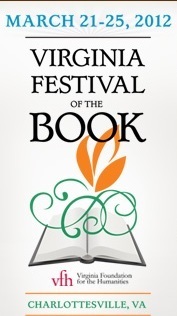 Today I managed to get to three events and enjoyed them all.
Today I managed to get to three events and enjoyed them all.First was "Finding Your Way"--four authors sharing the tales of their characters' journeys. This one featured Ernessa Carter (32 Candles), Sarah Pekkanen (These Girls), Lolette Kuby (Writing Personals), and Jason Wright (The Wedding Letters). I enjoyed the talks/readings of all four.
Then "Running From the Truth"--about the consequences of running away--featuring Amy Franklin-Willis (The Lost Saints of Tennessee), Elizabeth Nunez (Boundaries), David Huddle (Nothing Can Make Me Do This), and Robert Olmstead (The Coldest Night). I enjoyed all four of these authors' presentations, too.
Last of the day for me was "Conspiracies and Obsessions"--four authors discuss their novels of unraveling lives. This one featured Alma Katsu (The Taker), Amelia Gray (Threats), Virginia Moran (The Algebra of Snow) and Joe Lunievicz (Open Wounds). Again, all good presenters. In this case the moderator took a different approach. Instead of having the authors read or present their work, she just started in with questions, eventually leaving a little time for questions from the audience.
More tomorrow, including the panel I'm moderating . . .
Published on March 22, 2012 19:38
This debut novel by award-winning poet Janet McAdams is d...
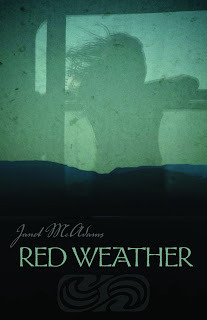 This debut novel by award-winning poet Janet McAdams is due out from University of Arizona Press on April 1, 2012.
This debut novel by award-winning poet Janet McAdams is due out from University of Arizona Press on April 1, 2012.For a description of the novel, which is about a young Native American woman, go here.
Here's what Roxana Robinson has to say about the book:
In Red Weather, Janet McAdams' lovely, lyrical firstnovel, her young Native American protagonist, Neva, travels to a small CentralAmerican country, in the hopes of learning what she needs to know about herfamily. Neva's story evolves slowly, through a mosaic of beautifully renderedmoments set against the somber backdrop of revolution. McAdams writesexquisite, crystalline prose, and Neva's story is both moving and elegiac.
--Roxana Robinson, author of Cost
Published on March 22, 2012 06:35
March 21, 2012
Virginia Festival of the Book: "Behind Closed Doors"
 Today is the first day of this year's Virginia Festival of the Book in Charlottesville. I was only able to get to one event today, although I had my eye on several on the schedule, but it was a good one.
Today is the first day of this year's Virginia Festival of the Book in Charlottesville. I was only able to get to one event today, although I had my eye on several on the schedule, but it was a good one.The title of the fiction program was "Behind Closed Doors" and I had no idea what it was going to be about, but the panelists were all novelists so I decided to give it a shot. (It turns out the title may have something to do with some dark secrets that the book deal with.)
The first author was Matt Matthews, author of Mercy Creek from Hub City Press, about a 16-year-old boy on Virginia's Eastern Shore. Next was Pamela Redmond, author of The Possibility of You, from Simon and Schuster. Last was David Winner, author of The Cannibal of Guadalajara.
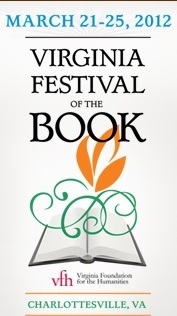 All three were engaging, but I was particularly interested in what Redmond had to say. She described her book as being set in 3 time periods: 1916, the 70s, and the present. And the section she read was 1916. Because the book I'm working on is set in two time periods (1916 and the present) I was curious about both structural and thematic linkages for the different parts of her story. Her answer was terrific. She said that she did a close reading of Michael Cunningham's The Hours and, at least initially, structured her book the same way. Hmm. So now I have to read Redmond's book and Cunningham's (I own it and should have read it a long time ago) before I get back to work on my new novel . . .
All three were engaging, but I was particularly interested in what Redmond had to say. She described her book as being set in 3 time periods: 1916, the 70s, and the present. And the section she read was 1916. Because the book I'm working on is set in two time periods (1916 and the present) I was curious about both structural and thematic linkages for the different parts of her story. Her answer was terrific. She said that she did a close reading of Michael Cunningham's The Hours and, at least initially, structured her book the same way. Hmm. So now I have to read Redmond's book and Cunningham's (I own it and should have read it a long time ago) before I get back to work on my new novel . . .I'm hoping to hit a couple of panels on Thursday.
Published on March 21, 2012 14:28
The Ethics of Book Reviewing
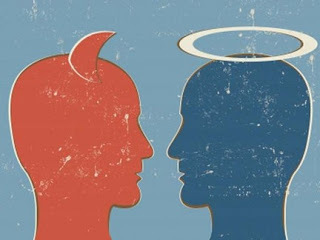 Last week I saw a book review by someone I know in an online newspaper (not a literary magazine) that gets a lot of exposure. The book under review was one by someone else I know—someone who is a very close friend of the reviewer. I read the review and looked for the disclaimer that informed the reader of the relationship, but there was none.
Last week I saw a book review by someone I know in an online newspaper (not a literary magazine) that gets a lot of exposure. The book under review was one by someone else I know—someone who is a very close friend of the reviewer. I read the review and looked for the disclaimer that informed the reader of the relationship, but there was none.The review was, as you might guess, extremely positive. (I own a copy of that book and plan to read it soon; knowing the author and his work, and liking both, I expect that I will enjoy it thoroughly.) Later I saw a review of the same book in another online publication. This one was also very positive, but this reviewer began by disclosing a long-standing friendship with the author. Although such a disclosure may call the reviewer's impartiality into question, at least the reader of the review was made aware of the possible bias and could factor that into a judgment about the review and the book. The reader of the first review would not have had the same information.
I was appalled by that first review. Of course, I don't know whether the fault lies with the newspaper or with the reviewer. Did the reviewer disclose the relationship to the editors and they chose not to run the disclaimer? Or did the reviewer just not tell them? Either way, though, the reading public was done a disservice.
On the other hand, I suspect that this is a common problem, or at least not limited to that one newspaper. The world of writers is in many ways small, and reviewers are often acquainted with the authors of books they are asked to review. I have turned down some reviewing assignments for that reason. And if I do write a review of a book by a friend, I'm sure to let the editor know. Last year The Nervous Breakdown asked me to write a review. I am friendly with the author and I told the editors that this was the case. They included a note to that effect with the review. Correctly, in my opinion. But if you read a review and you don't see such a disclaimer, can you assume that the reviewer is impartial? No, apparently not. There's a pretty good chance, it seems to me, that the review will be biased in some way. No wonder book reviews are disappearing. If you can't believe them anyway, what good are they?
Note that we're not talking about Amazon.com reader comments here, which could be posted by anyone—the author's mother or his lover or even the author himself. I'm not even talking about reviews on a personal blog. I'm concerned here with real book reviews in real, edited publications that make some claim to being credible.
Perhaps there is a Code of Ethics for book reviewers. I looked at the website of the National Book Critics Circle and didn't find one, but that doesn't mean it doesn't exist. In the meantime, though, I very much like the approach of Rain Taxi Review of Books , which includes the following in its guidelines for reviewers:
Rain Taxi is dedicated to publishing unbiased, objective reviews. If you have a connection with the author or press, please disclose it upon submission. Not all relationships constitute conflicts of interest, but we respectfully request your candor regarding any relationships. If you are friends with an author and would like to highlight their work, please feel free to email us and suggest a review, or consider pitching an interview instead.
That, it seems to me, is the right way to go, and I feel I can give some credence to reviews I read in Rain Taxi. This other publication I mentioned—not so much.
Published on March 21, 2012 05:22
March 19, 2012
The New Yorker: "Chapter Two" by Antonya Nelson
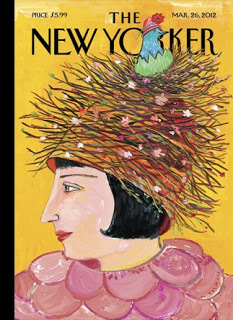
March 26, 2012: "ChapterTwo" by Antonya Nelson
I've certainly read stories by Antonya Nelson that I likedmore than this one, although there is some cleverness on display. The story isabout Hil, who lives with her son Jeremy and the obese Janine, a woman who goesto AA meetings in order to meet men (that hasn't worked out to well) and tellstories. The stories she tells are about her neighbor, Bergeron Love, who is .. . odd. It develops, though, that Bergeron has died, putting an end to Hil'sstories, until it is suggested that it is simply time for "Chapter Two."
I do think there's something here about storytelling and thecontroversial fact/fiction debate—Hil, after all, is at the AA meetings underfalse pretenses. So what about her stories are true? Or has she made them up?Left out details (such as Bergeron's death)?
The Q&Awith Antonya Nelson is interesting on the gap in the story about Hil's ownlife—we know more about Bergeron. Nelson says in some ways Hil's own story isn'tavailable to her in the same way as Bergeron's story is. That, it seems to me,is a great observation for writers like me who are tempted to pour in morebackstory than a narrative can really bear, and often it isn't necessary.Nelson gives us one reason why it might not be necessary.
Published on March 19, 2012 16:18
March 16, 2012
Review Review Review
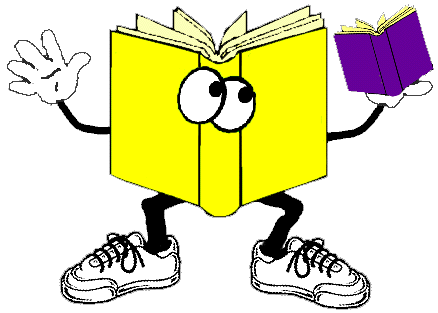 This year I have been posting about literary magazines--not reviewing them, exactly, but for my own edification attempting to describe the kind of fiction those magazines publish. (See previous posts in the Year of the LitMag series.)
This year I have been posting about literary magazines--not reviewing them, exactly, but for my own edification attempting to describe the kind of fiction those magazines publish. (See previous posts in the Year of the LitMag series.)But there are a few websites that take a more serious approach to reviewing literary magazines, and I thought I'd mention them in case anyone reading these posts doesn't know about them.
The first that I knew about was New Pages. New Pages is a terrific resource--for contests, book reviews, lists of markets, and more--including their regular reviews of magazines. Very useful stuff. There's so much there, in fact, you'll want to explore and bookmark the site.
Then about a year ago, I guess, I became aware of The Review Review. I love it. This magazine is focused and also includes tips and editor interviews. (They did a review of Prime Number Magazine not long ago.)
And then there's Luna Park Review. I'd heard of Luna Park, but I didn't really take the time to look at it closely until they started ReTweeting my YLM posts. It turns out, though, that it's all about literary magazines. I love it!
So please read all of these other sites for great information on literary magazines. I'll continue to post my own take on magazines, just because I've got huge stacks of them and the project keeps me motivated to plow through them. But at the same time, I'm reading what these other folks have to say.
[And, by the way, if you know of other sites that do something similar, please leave a comment with the name. Thanks!]
Published on March 16, 2012 13:06
Virginia Festival of the Book
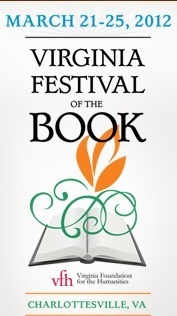 One of the highlights of the year in this area--the literary year at any rate--is the Virginia Festival of the Book. And I can hardly believe that it's hear already. The festival this year is March 21-25.
One of the highlights of the year in this area--the literary year at any rate--is the Virginia Festival of the Book. And I can hardly believe that it's hear already. The festival this year is March 21-25.I've scoped out a number programs I hope to attend, but so far the only thing I know for SURE that I'll see is the one that I was asked to moderate, next Friday, March 23, at 6pm, at the Charlottesville Barnes & Noble. The panel is called "Reconstructions" in which Casey Clabough, Taylor Polites, and Joe Samuel Starnes will discuss their novels. Since I haven't finished reading them yet I'm not sure how they fit together, but I'm sure it will be a terrific program.
Some other writers who are on tap over the course of the festival: Margot Livesy, Tayari Jones, Hillary Jordan, Sharyn McCrumb, Jenny Gardiner, Jill McCorkle, Lee Smith, Sandra Beasley, and many, many more.
Hope to see you there!
Published on March 16, 2012 12:16
Year of the LitMag: Indiana Review, Vol. 33, No. 2
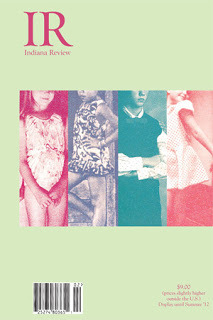 [This is the latest in my Year of the LitMag series. If you would be interested in doing a guest post in the series, let me know--leave a comment or send me an email--to let me know which issue of which magazine you'd like to discuss.]
[This is the latest in my Year of the LitMag series. If you would be interested in doing a guest post in the series, let me know--leave a comment or send me an email--to let me know which issue of which magazine you'd like to discuss.]Indiana Review, Vol. 33, No. 2
Indiana Review has a reputation for being a little edgy, a market for stories that are unusual in subject, style, or form. This issue ought to confirm that rep.
The first story is "The Stolen Cloned Mammoth" by Shane Castle, bout two competing biotech companies, one of which sends the other a cloned woolly mammoth. Chaos ensues. Then there's Adam Schuitema's "Gunplay," which is the history of a boy's relationship with his father, from cradle to grave, told through his connection to guns. It feels fragmented, as does "Things to Do with an Open Wound" by Steven Ramirez, which is in the form of a list (each one amplified with an anecdote) of bad ideas. "Staccato" by Peter Tieryas Liu is also fragmented--as the title suggests. Liu is telling the story of a visitor to Beijing in a series of very short vignettes. "Palimpsest" by Kim Magowan tells of a series of sexual encounters that "don't count" for various reasons. "The Creeper" by Briandaniel Oglesby is told in longer fragments. "Practice" by James Miranda is one short fragment--a flash--and Mary Hamilton has two very short pieces that also feel fragmented. The first one, "Fucking Birds," is about Marco who "lost his face in Colorado" and "Marco" is the first word of each paragraph.
On the other hand, some of the stories are practically traditional by comparison, including "Pilanesberg" by David Guterson and "Beneath the Surface" by Amy Butcher. Guterson's story is about a brother and sister (recovering from chemo) visiting a South African game preserve. Butcher's is about a woman who's boyfriend is called home because his cousin dying. Both are good, compelling stories.
"Sam and Annie: A Kind of Love Story" by Joe Wilkins is also more or less traditional in form. It involves a 10-year-old boy who is stalking Annie, a pretty prostitute, and struggling to deal with his father, who is both a drunk and a con-man. I'm not a fan of stories about kids, but I felt sorry for this one.
So IR seems to like offbeat, although they also publish stories that are somewhat traditional.
[This issue also has several fine essays and numerous poems that I'm not able to comment on.]
Published on March 16, 2012 11:50



